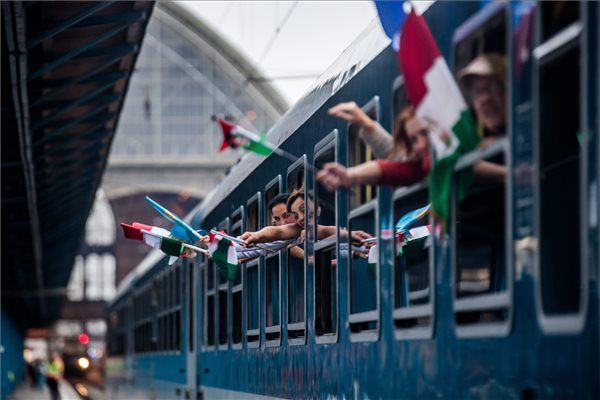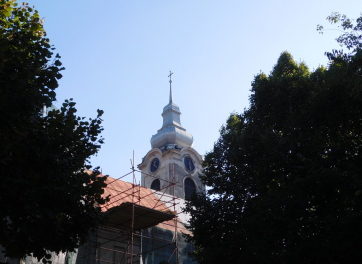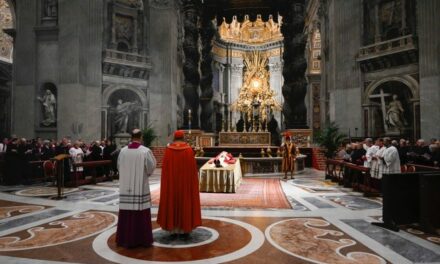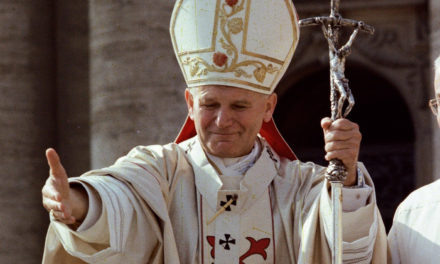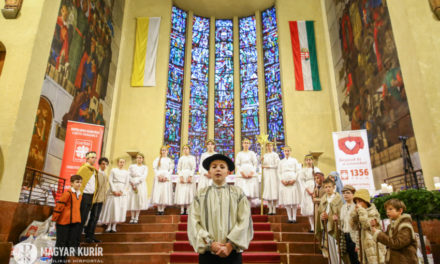András Veres, the president of the Hungarian Catholic Bishops' Conference, spoke about the fact that every person, whether religious or not, lives there to meet the saint. For this meeting, you have to be open and you have to make sacrifices for it, that's what the pilgrimage is about, he added.
The president of the MKPK explained that every pilgrim sets out with the desire to meet the saint, and when he gets home, he wants to pass on something from the experience of the encounter to his loved ones. Therefore, we do not go on a pilgrimage primarily for ourselves, because we know that if we share the experience of meeting the saint with others, it will really benefit us too, said András Veres.
Miklós Soltész, the State Secretary of the Prime Minister's Office responsible for church and ethnic relations, emphasized that pilgrim trains provide an opportunity for joint prayer and meeting. This year, in the shadow of the war, these pilgrimages also serve to resolve tensions between each other, he added.
The destinations of the pilgrimages are also important, in addition to the spiritual experience, the trains from Csíksomlyo also improve Hungarian-Romanian relations, and the pilgrimage to Czestochowa in Poland, also organized by the Mission Tours, is a testament to the Polish-Hungarian friendship.
The State Secretary also spoke about:
every year, the presence of young people living in child protection, from across the border, and from the diaspora on the trains is a great experience. They are the ones who pass on the pilgrimage experience to their companions as a mission.
László Mosóczi, the general manager of MÁV-Start Zrt., said: this year, for the 10th time, a pilgrimage train, organized jointly with Missizío Tours, will go to perhaps the most important meeting of Hungarians. More than 1,600 pilgrims are expected to travel on the Boldogasssony and Mission train.
Csáky Csongor, the president of the Rákóczi Association, indicated that the Czíksomlyo pilgrimage has been part of the youth programs of the Rákóczi Association since 2018. In recent years and this year, 300 students were invited to the train pilgrimage. The majority of students come from Catholic schools across the border, and high school students living in the diaspora will also be able to apply this year.
He added that in 2022, 100 Transcarpathian mothers could also join the program to pray together for peace in Csíksomlyo. Csongor Csáky expressed his hope that there will be an opportunity for Transcarpathian Hungarians to participate in the pilgrimages this year as well.
At the press conference, the letter of László Kövér, the President of the Parliament and the chief secular patron of the pilgrimage train of the Blessed Virgin Mary, was read out. The Speaker wrote:
whoever goes on a pilgrimage prepares, closes the door of his house and opens his heart. He leaves behind him the things of everyday life in order to pay attention to the most important things, to weigh his life before God, to understand where he is and where he needs to go.
He put it this way: it is particularly important that in the midst of our everyday struggles - when war is raging along our eastern borders, and in the western part of Europe, which has lost its faith, our Christian culture is being destroyed without weapons - the believers should set out together from time to time, bear witness to their faith together - he said.
László Budai, managing director of the organizer Misszió Tours, said that there is more interest than ever in their train and bus pilgrimages. It seems that in our world that is slipping apart, there is a huge demand for handholds, he noted.
In addition to the pilgrimage trains from Csiksomlyo, domestic pilgrimage trains are being organized this year as well. He highlighted the Mátraverebély-Szentkút pilgrimage train and indicated that their plans also include a Zalaegerszeg-Mindszenty pilgrimage train, László Budai added.
The Pilgrimage Train of the Blessed Virgin Mary leaves on Thursday, May 25 and returns to Budapest on the 28th. The Mission, a special train with recumbent and seated cars, departs on the afternoon of Friday the 26th, then returns in the evening after the vow farewell on Saturday and arrives in Budapest on Whit Sunday morning. it leaves for Csíksomlyó on Friday, the 26th, and also arrives back in Budapest on the 28th.
The detailed program of the pilgrimages can be found on the travel agency's website.
The spiritual leader of the blessed train will be Pécs County Bishop László Felföldi, and the spiritual leader of the Mission Pilgrim Train will be Franciscan monk Csaba Böjte.
According to legend, the first farewell procession in Csíksomlyo was held in 1567, when the Transylvanian prince János Zsigmond wanted to force the Catholic Szeklers to adopt the Unitarian religion at gunpoint. The people of Csík, Gyergyó and Kászon gathered in Csíksomlyo on Pentecost Saturday, asked for the help of Szźz Mária, and then defeated the prince's army at the Hargita Tolvajos pass. After the victory, they gave thanks again in Csíksomlyo, and also made a vow to make a pilgrimage there every year on Pentecost Saturday.
MTI
Cover image: Illustration / The Csíksomlyó Expressz and the Székely Gyors roll out of the Keleti. Photo: MTI/Zoltán Balogh

